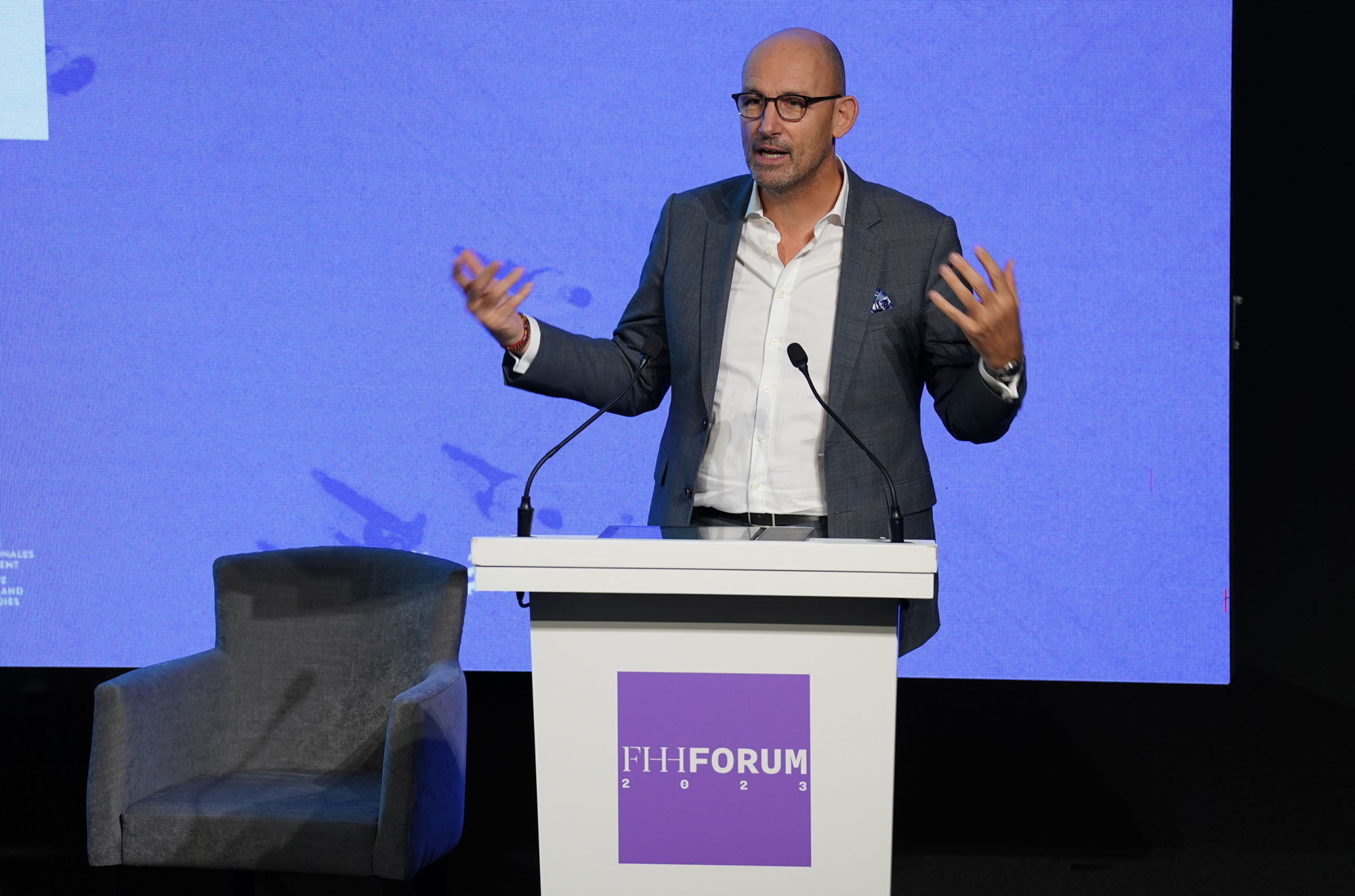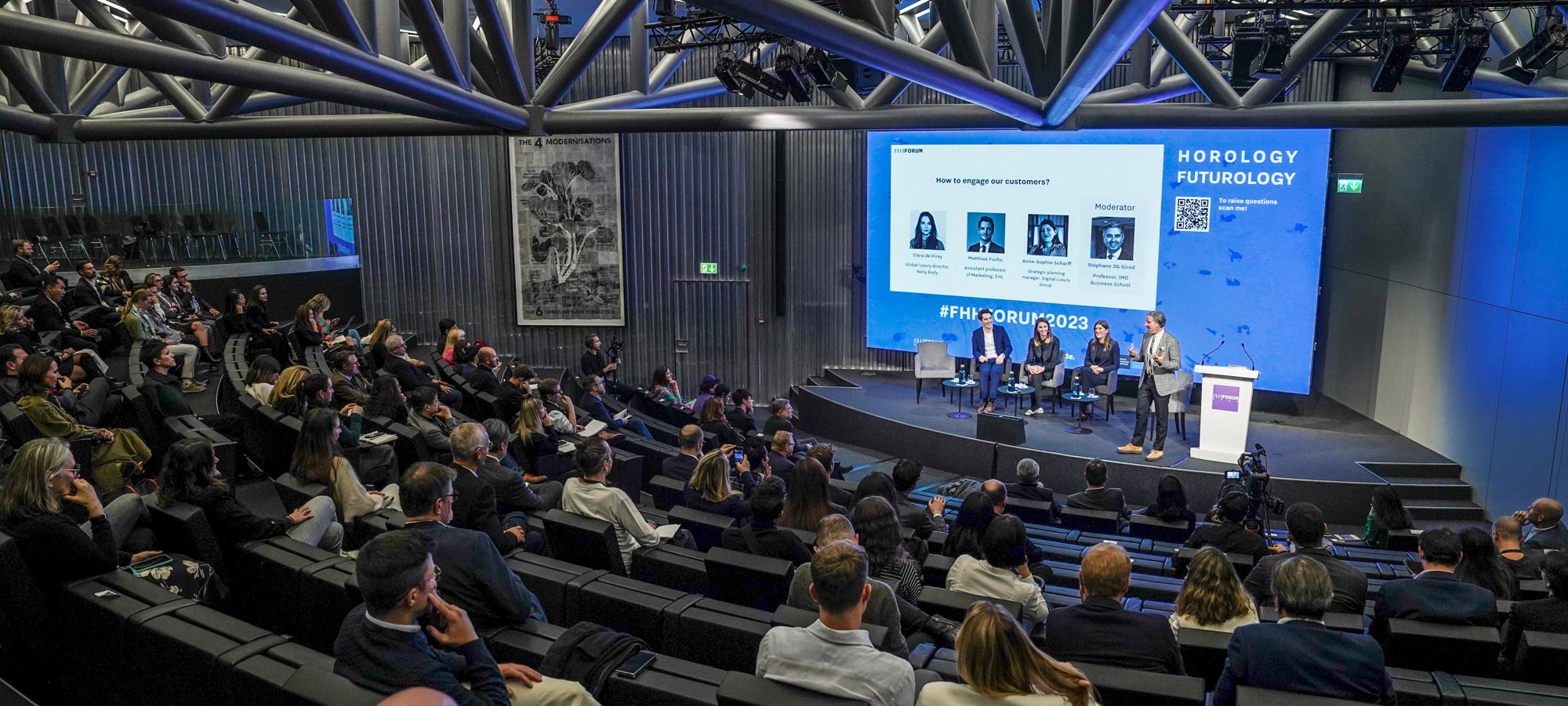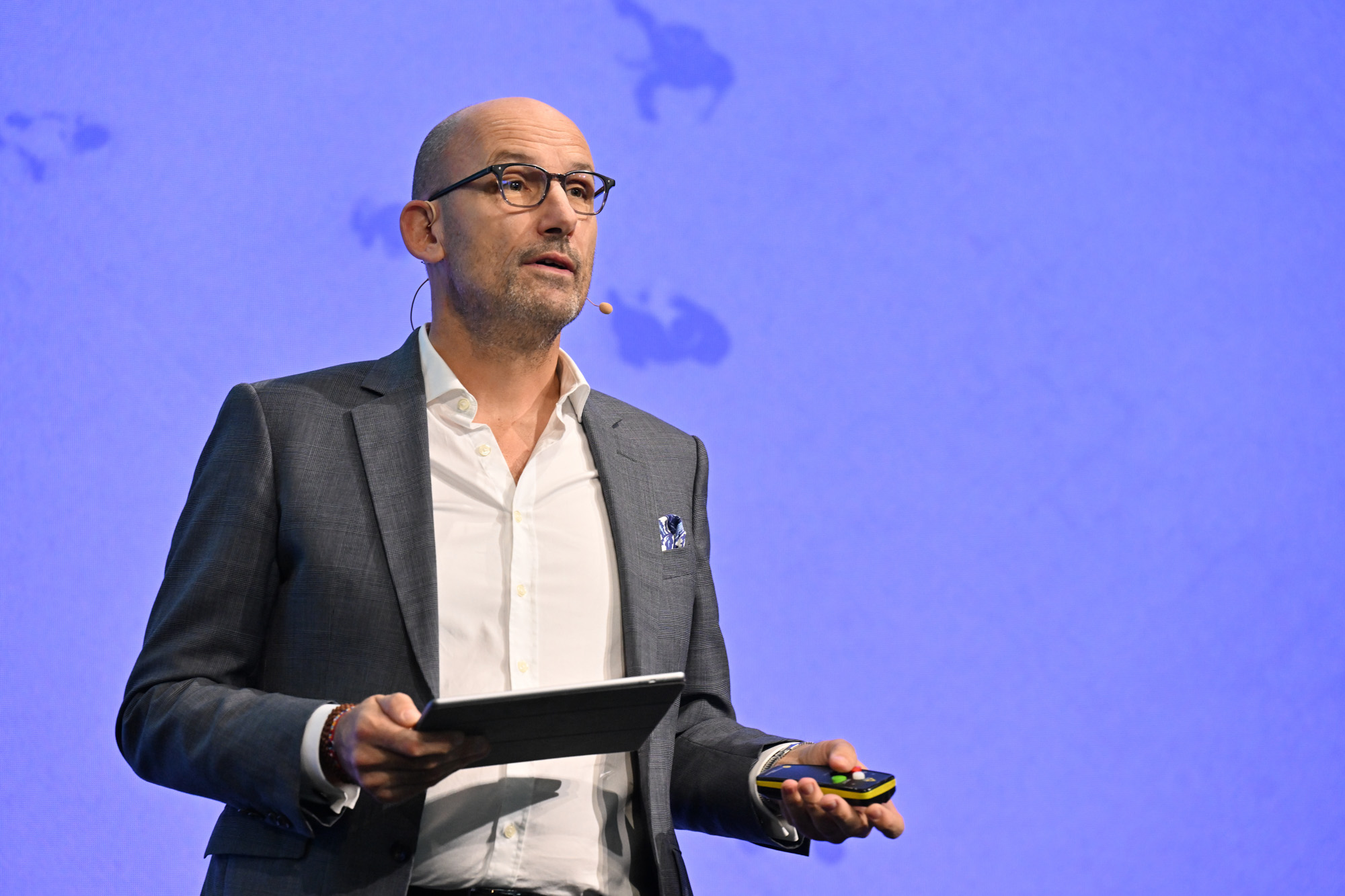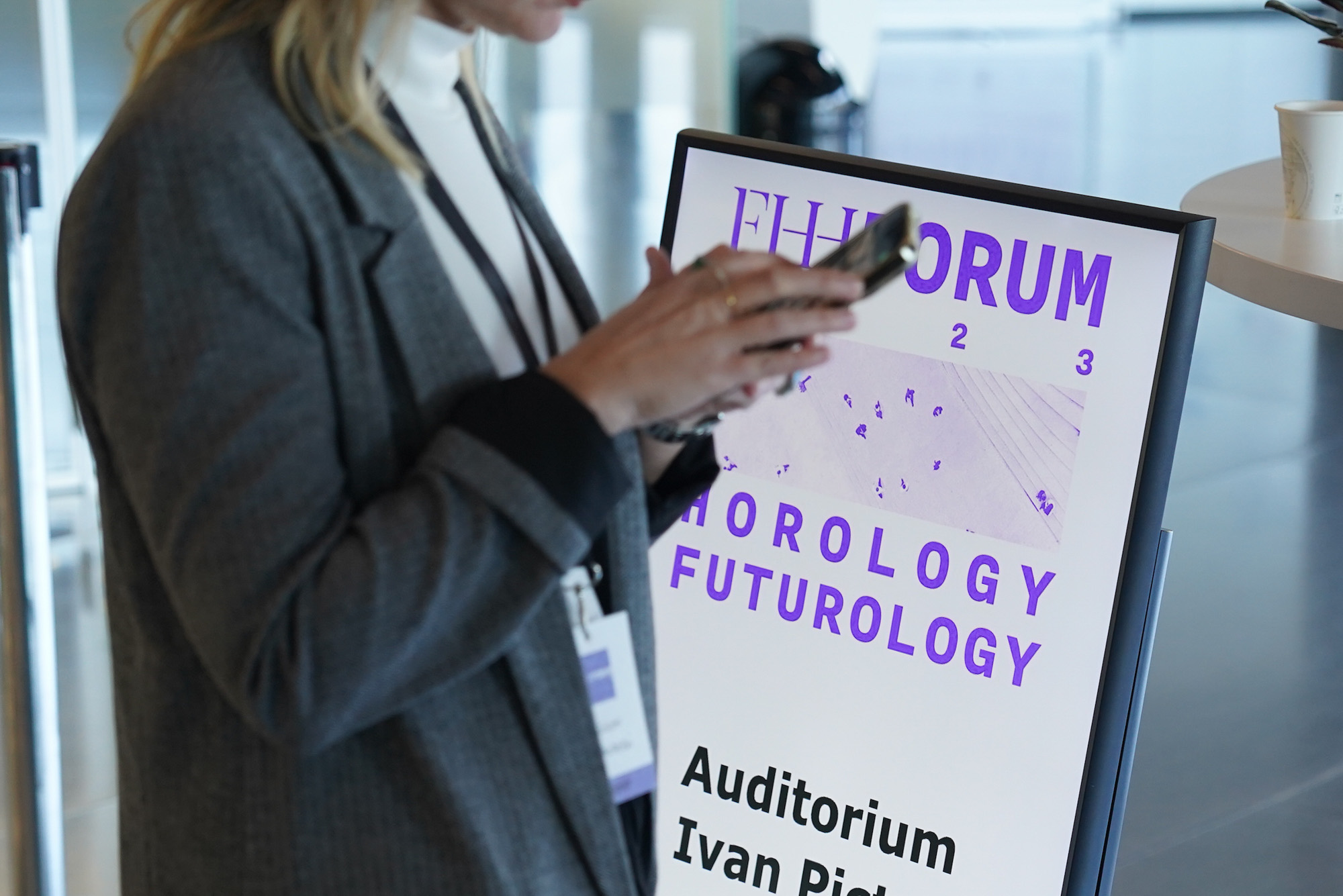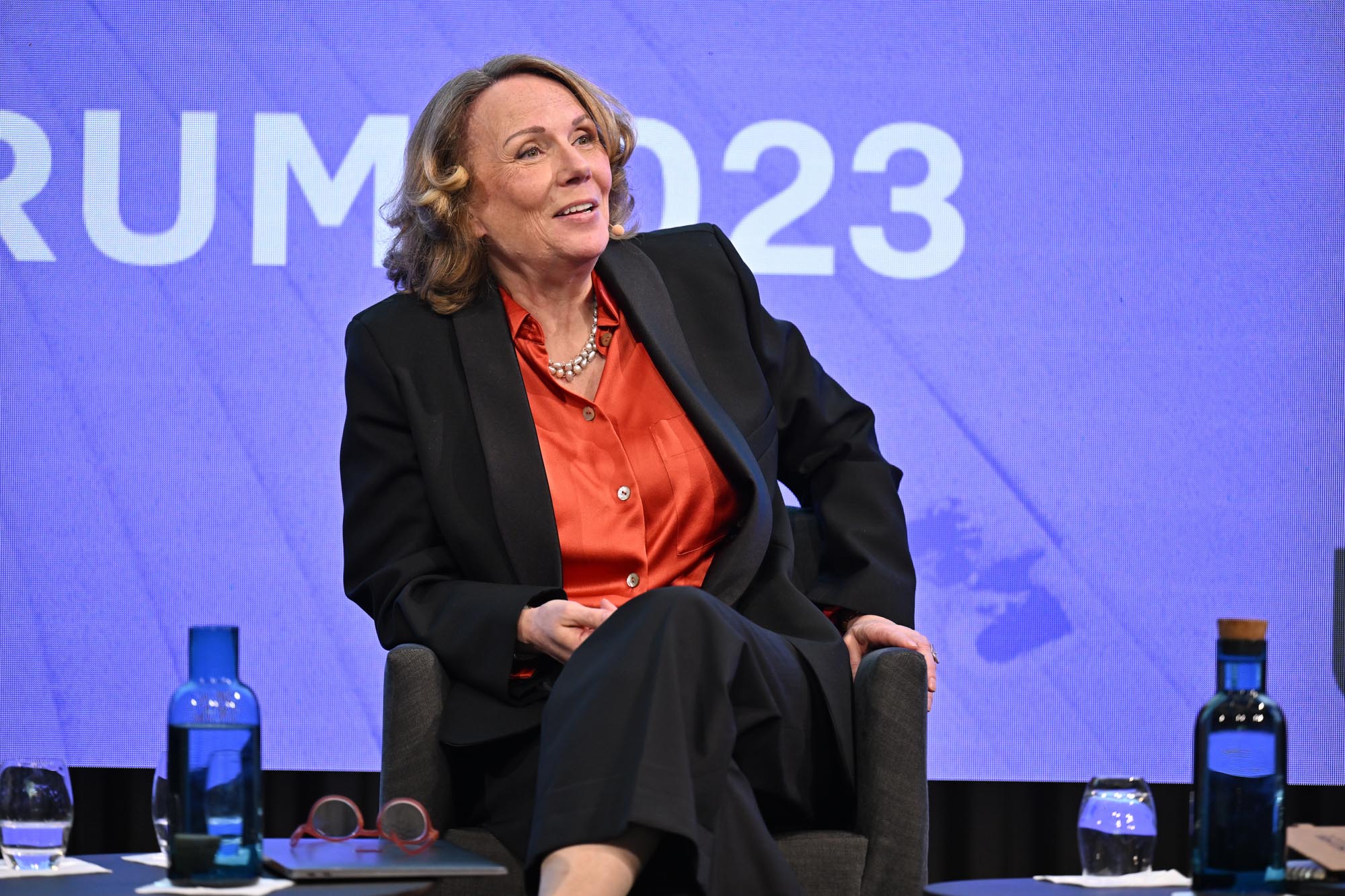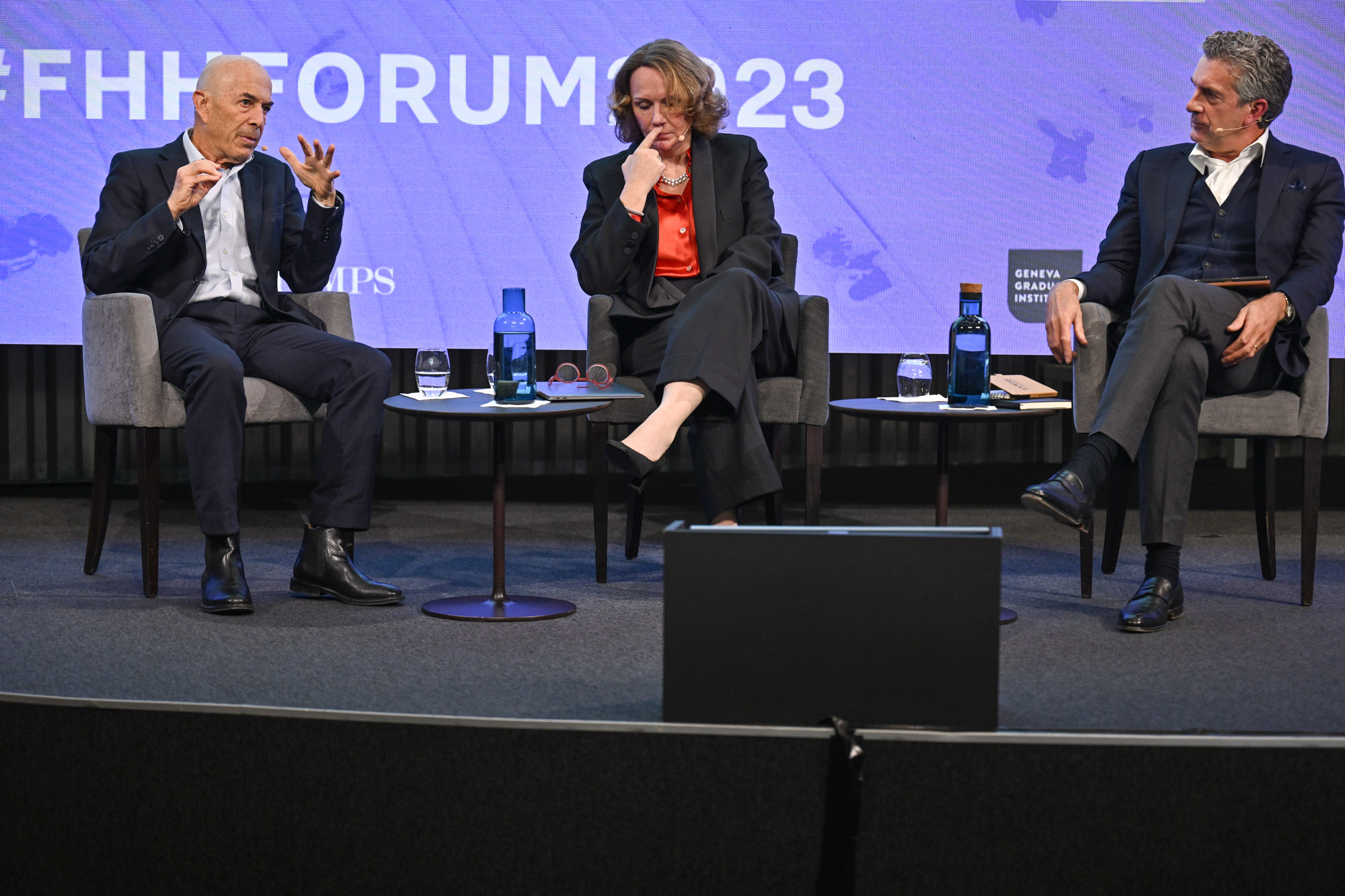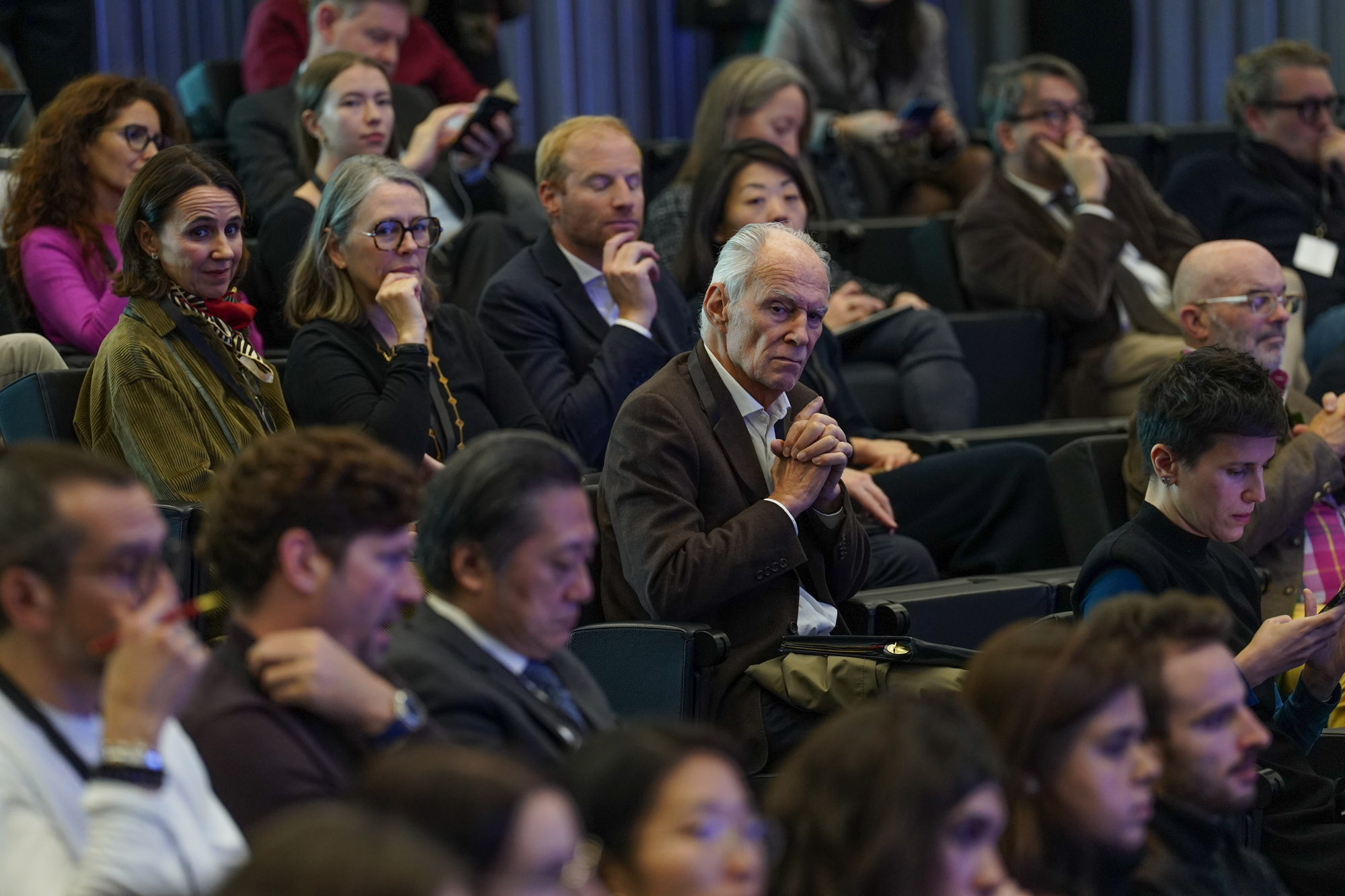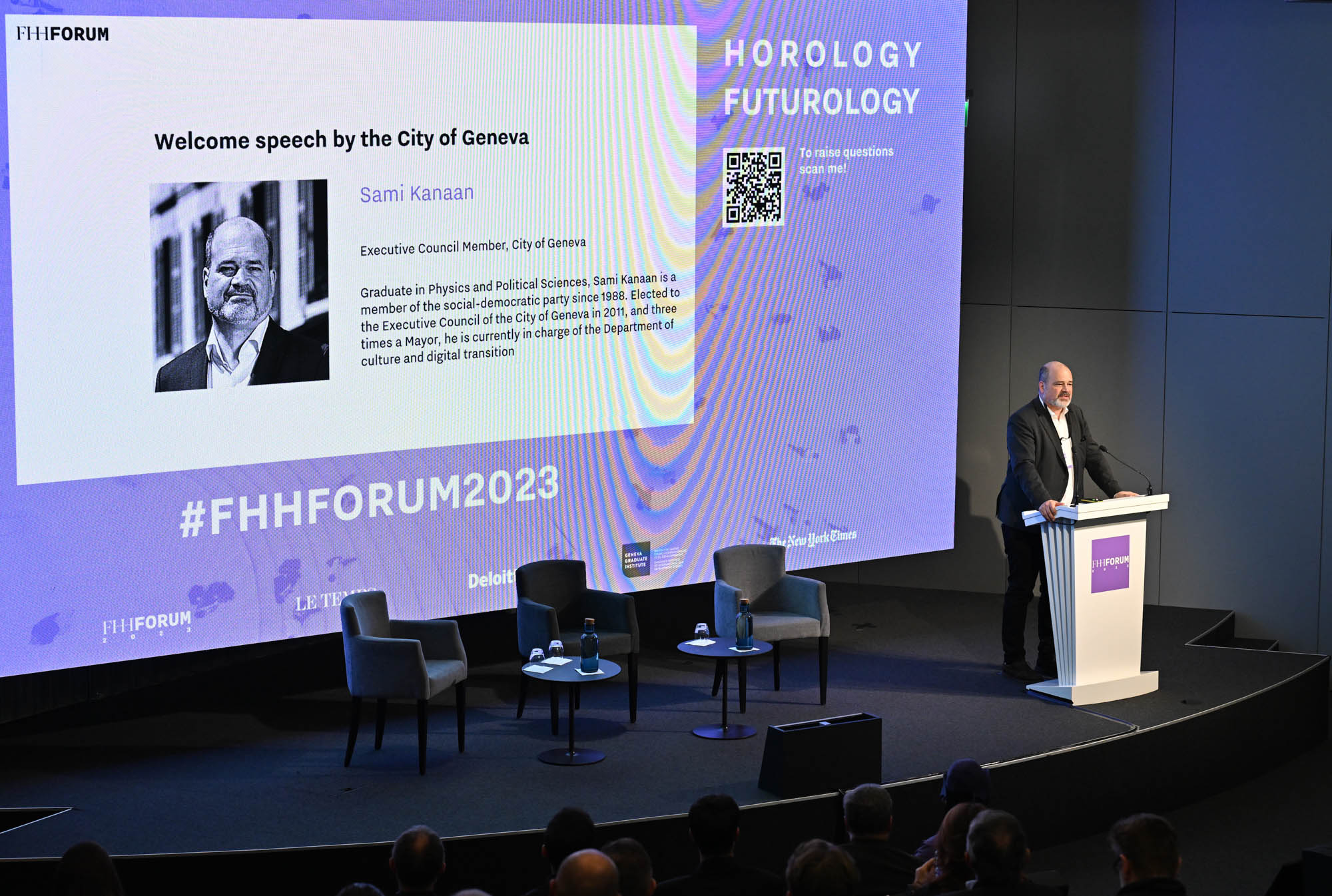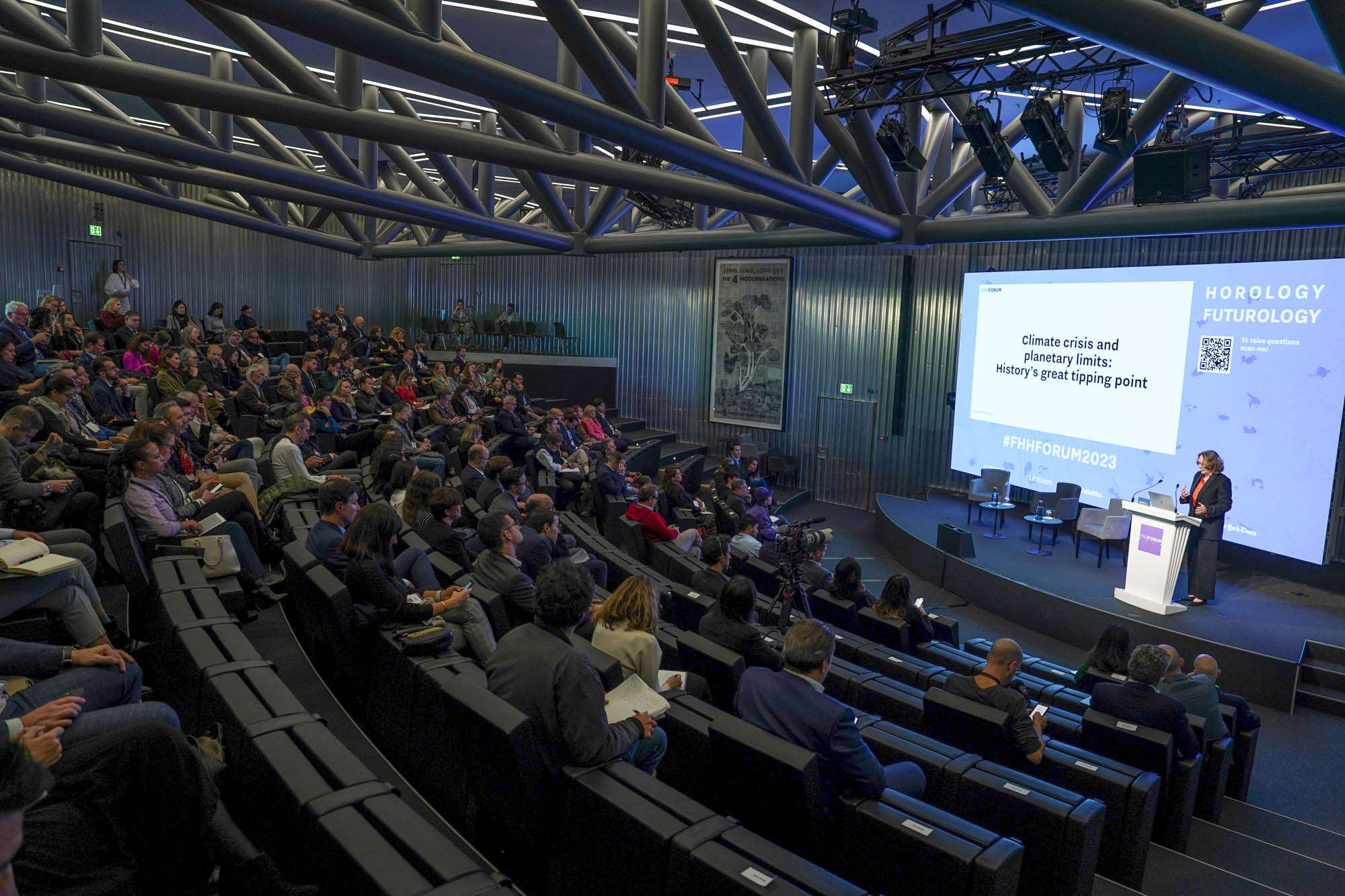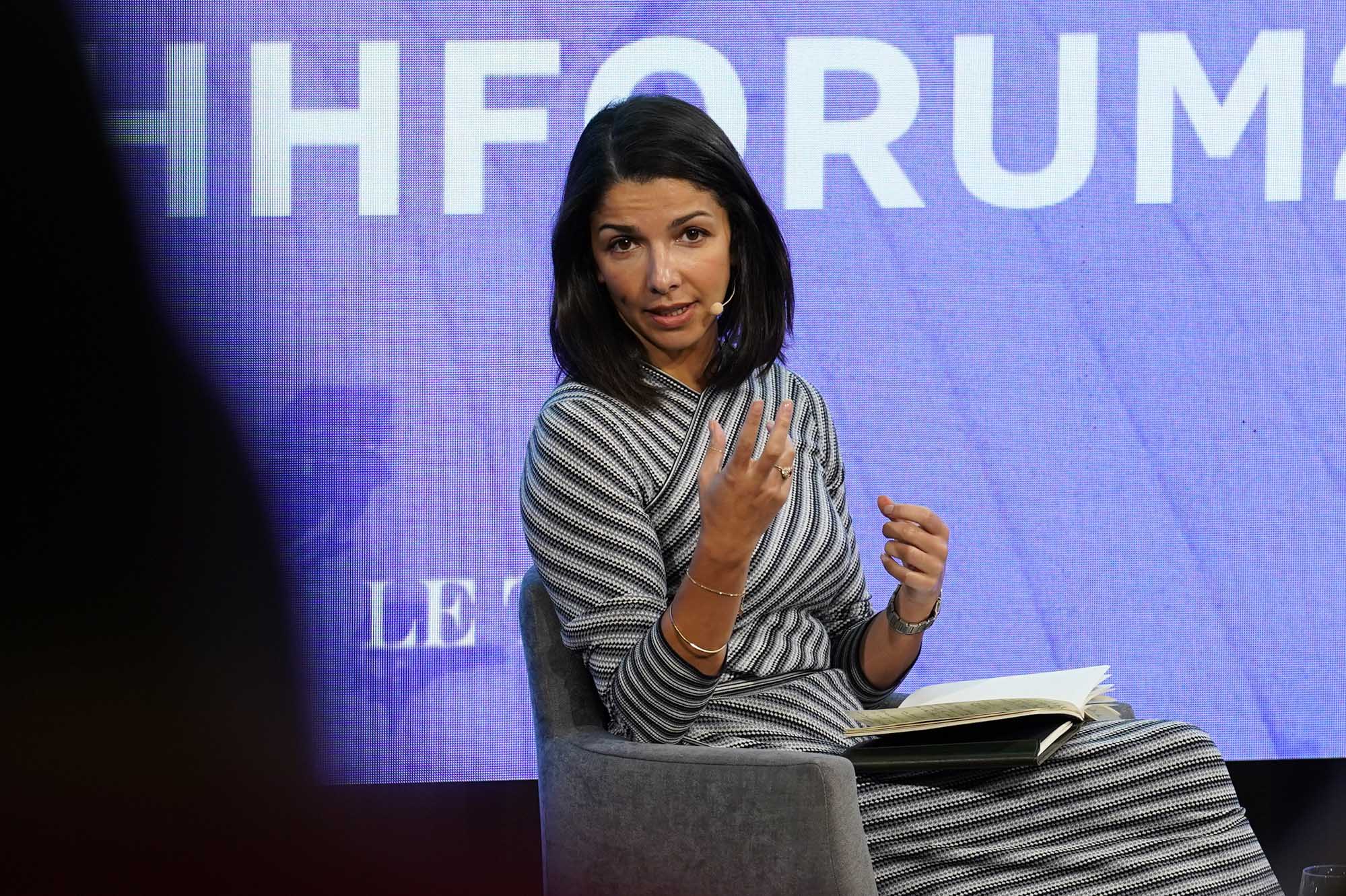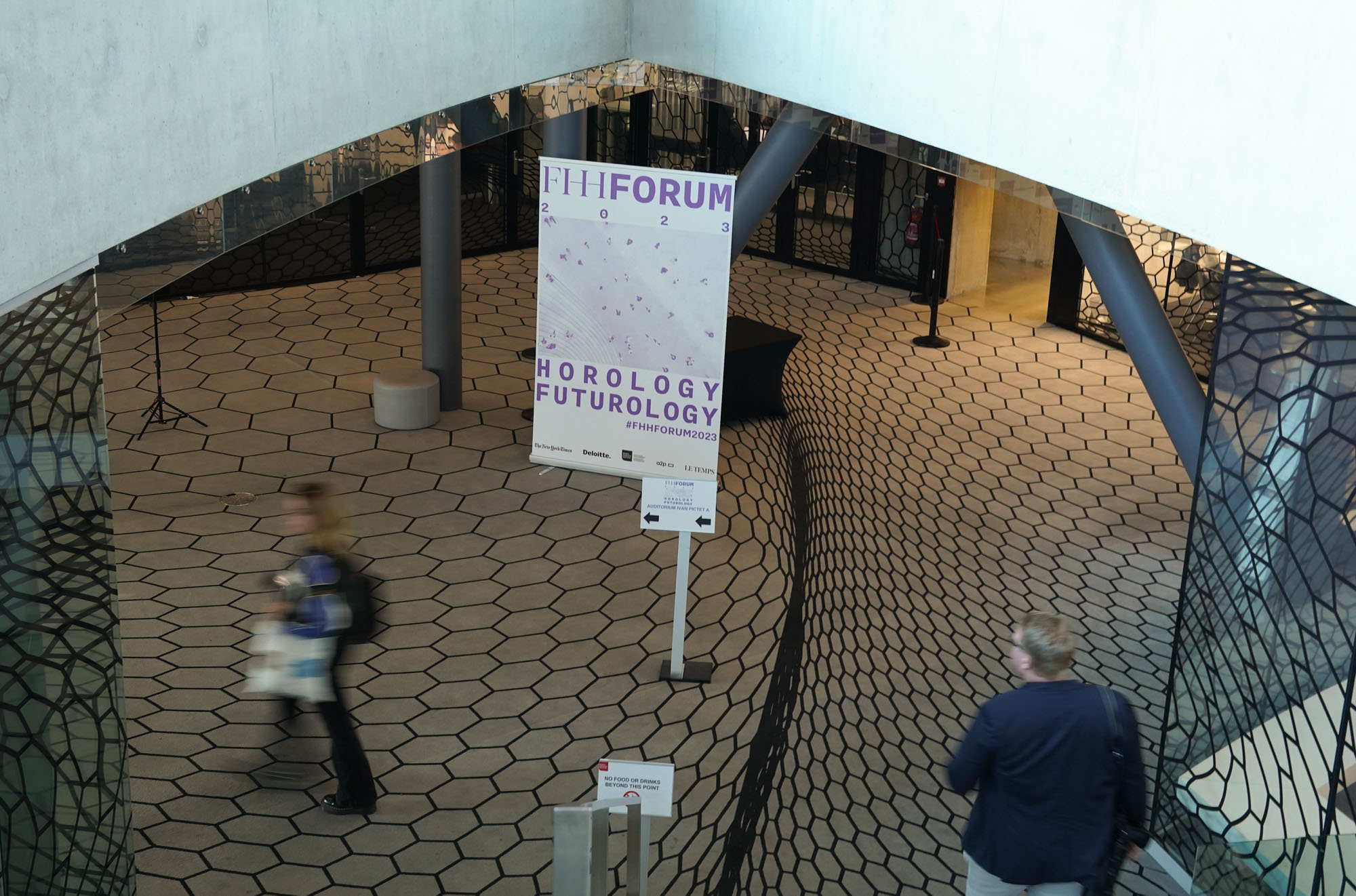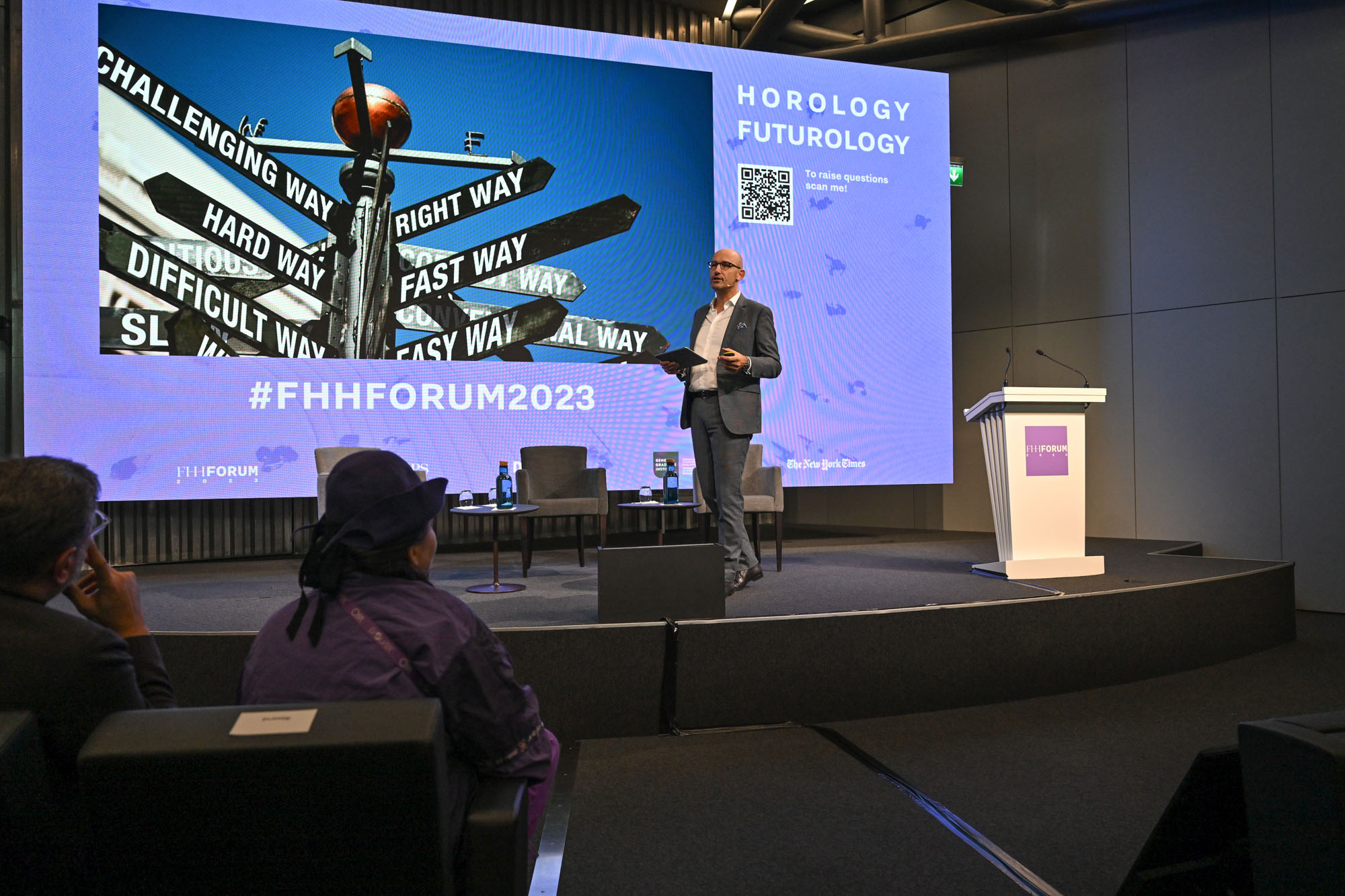
Sponsored post presented on aBlogtoWatch for advertiser
The Fondation Haute Horlogerie successfully hosted the 11th edition of the FHH Forum at the Maison de la Paix in Geneva on November 8, 2023. Under the evocative theme “Horology Futurology,” the event saw the participation of around 200 people and proved to be a crossroads of avant-garde ideas and constructive debate, guided by exchanges and in-depth discussions with renowned experts.
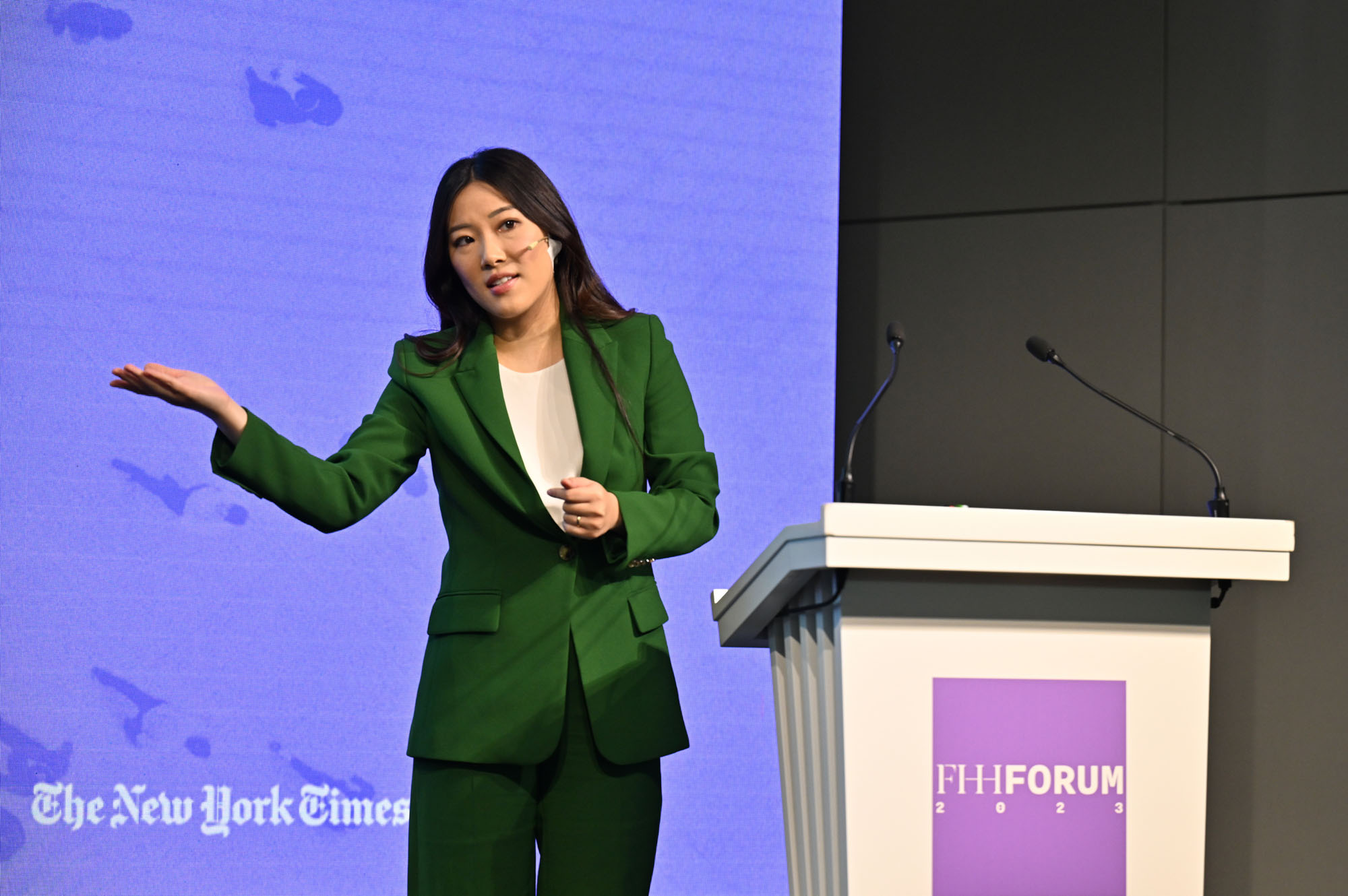
Moderator Olivia Kinghorst on stage during the 2023 FHH Forum on November 8, 2023 in Geneva, Switzerland.
Hosted by Olivia Kinghorst, the day echoed the mission of the Forum and that of the FHH: to ensure the sustainability and adaptability of the watch industry by fostering dialogue and debate. The FHH Forum gave an opportunity to candidly glance into the minds of leaders of their fields and receive a condensed presentation of all the most important issues, starting from a global point of view concerning climate change and sustainability and gradually moving toward a micro-level to the concerns, ideals, and behaviors of the individual watch buyer.
Delphine Bachmann, State Councilor of the Canton of Geneva, Sami Kanaan, Member of the Executive Council of the City of Geneva, and Pascal Ravessoud, Vice-President of the FHH, laid the groundwork for this day of reflection. Their speeches underlined the FHH’s desire to rise to the occasion in the face of current and future challenges.
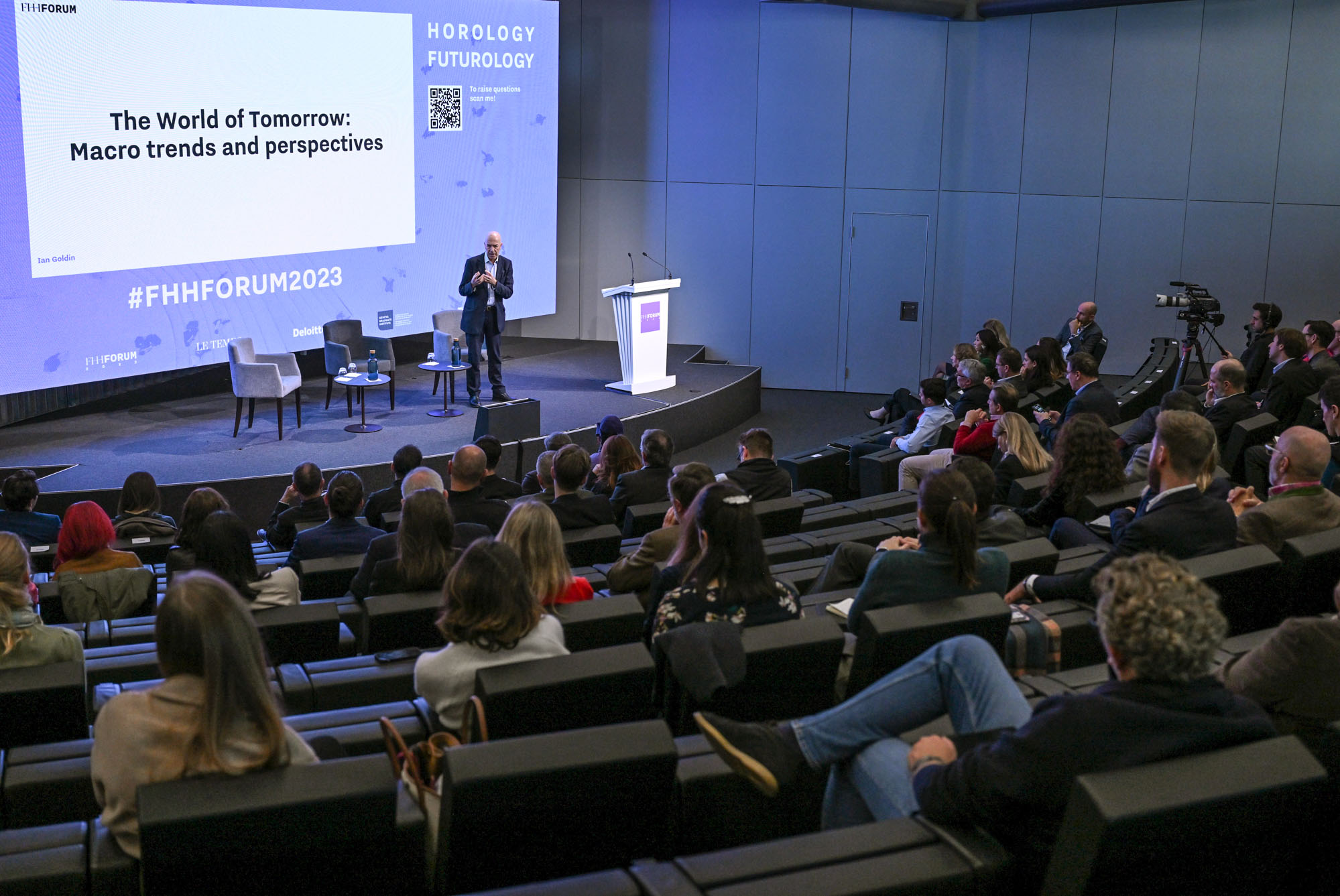
Ian Goldin, Oxford University Professor, global futurist, and expert on the future of finance, risk, and markets, on stage during the 2023 FHH Forum.
Then, Ian Goldin, Professor at the University of Oxford and world expert in futurology, and Virginie Raisson, President of the IPCC Pays-de-la-Loire, captivated the audience with their keynotes on “The World of Tomorrow: Macro Trends and Perspectives.” Importantly, Goldin drew a parallel between today’s explosive growth and complexity and that of the Renaissance and reminded us that humanity is once again at a historic crossroads. The question stands: Will this be our best century ever where we can harness the creativity of 8 billion people, or will this renaissance end in war and tears, like the one that began in Florence over half a millennium ago.
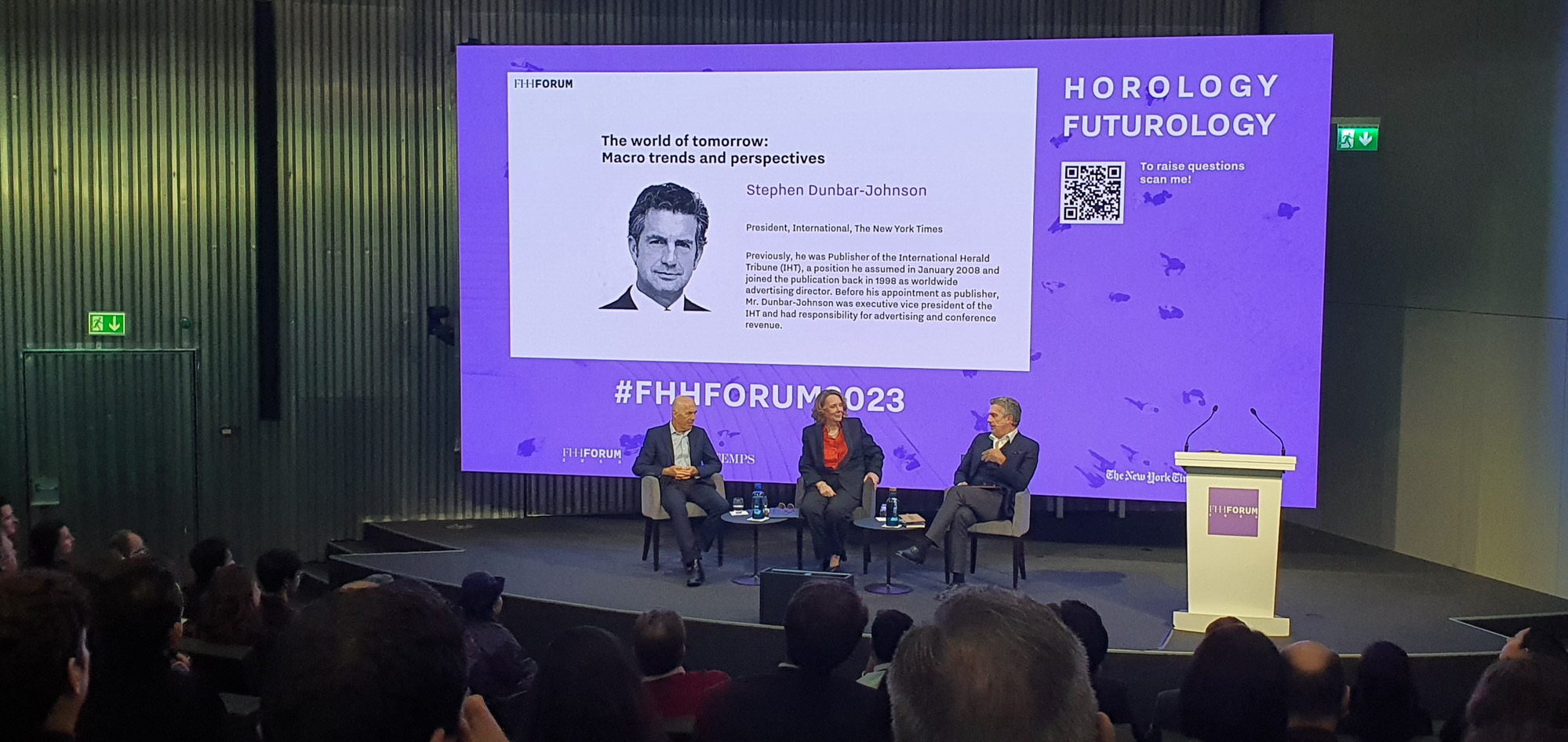
The question was raised: “What are the things people will be worried about when they think about buying a watch?” with a notable reminder that “Today is the richest day in the history of the world. If you can’t make money, it’s not because money isn’t there, but because people don’t want your product.” As disposable income rises, customers purchase fewer and fewer things and more and more psychological satisfaction. They transfer into the quality of the product and what it means for their identity, and so the quality of craftsmanship receives a bigger and bigger part of their disposable income. This is where the world is going in terms of the bulk of the population — an enormous, arguably unprecedented growth in search not of one’s basic needs, but psychological satisfaction.
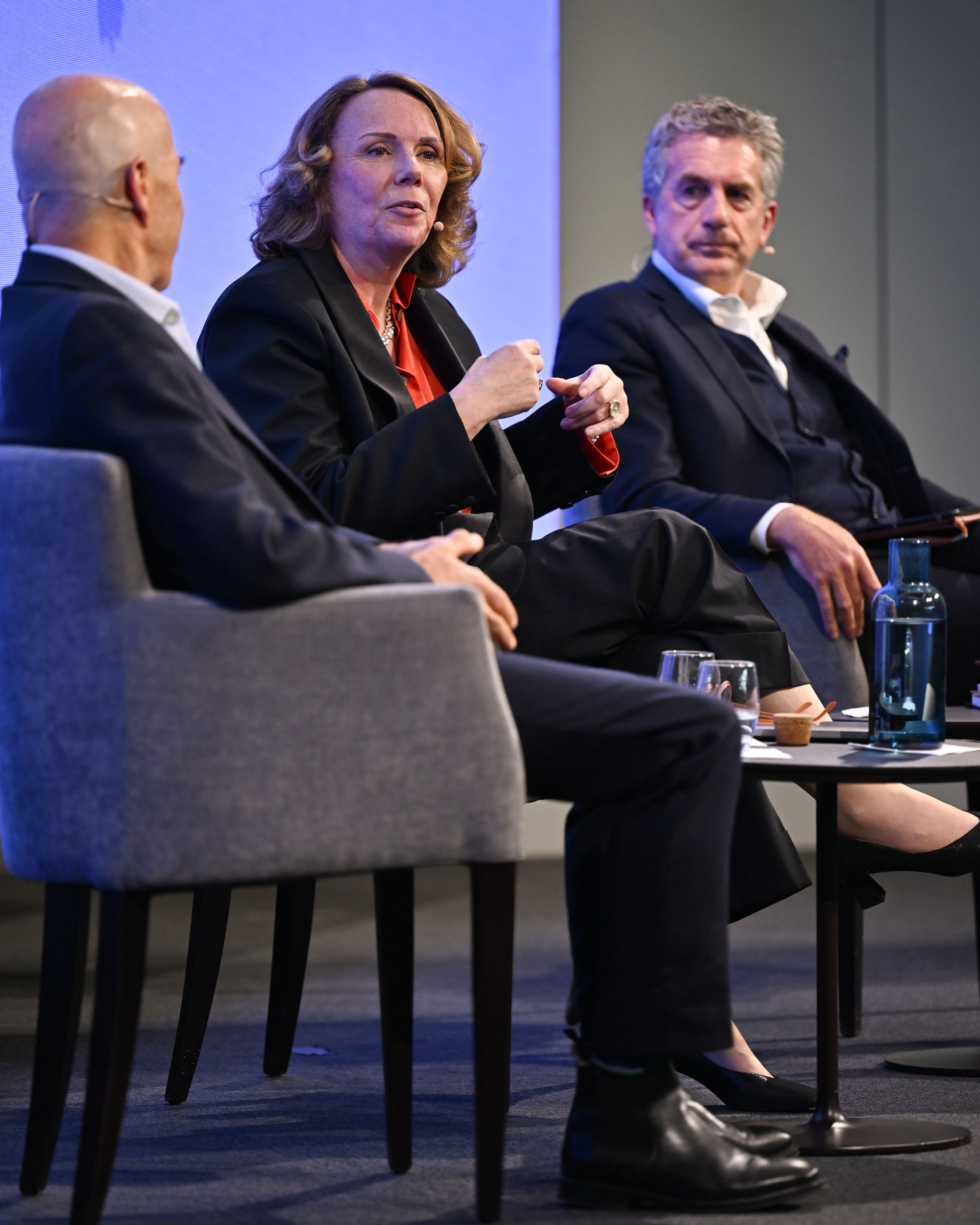
Center: Virginie Raisson, Geopolitics analyst and prospectivist, President of the IPCC Pays-de-la-Loire.
Presenters and panelists highlighted the significant impact of exogenous factors on the watch sector, opening the way to enriching discussions. Continuing with these reflections, Stephen Dunbar-Johnson, President International for the New York Times, brilliantly moderated a Q&A session dedicated to managing the tensions between individual freedoms and the common good, drawing on historical and current data to illuminate the debates.
The transition was then made toward the theme of “Humans and Nature,” where Bruno David, former director of the French National Museum of Natural History, made the case for an educational revolution and strengthening our link with biodiversity. In a continuation of thought, Inès Léonarduzzi brought another dimension in “How to Manage Short and Long Time for Business Efficiency?” encouraging long-term vision in entrepreneurial strategies.
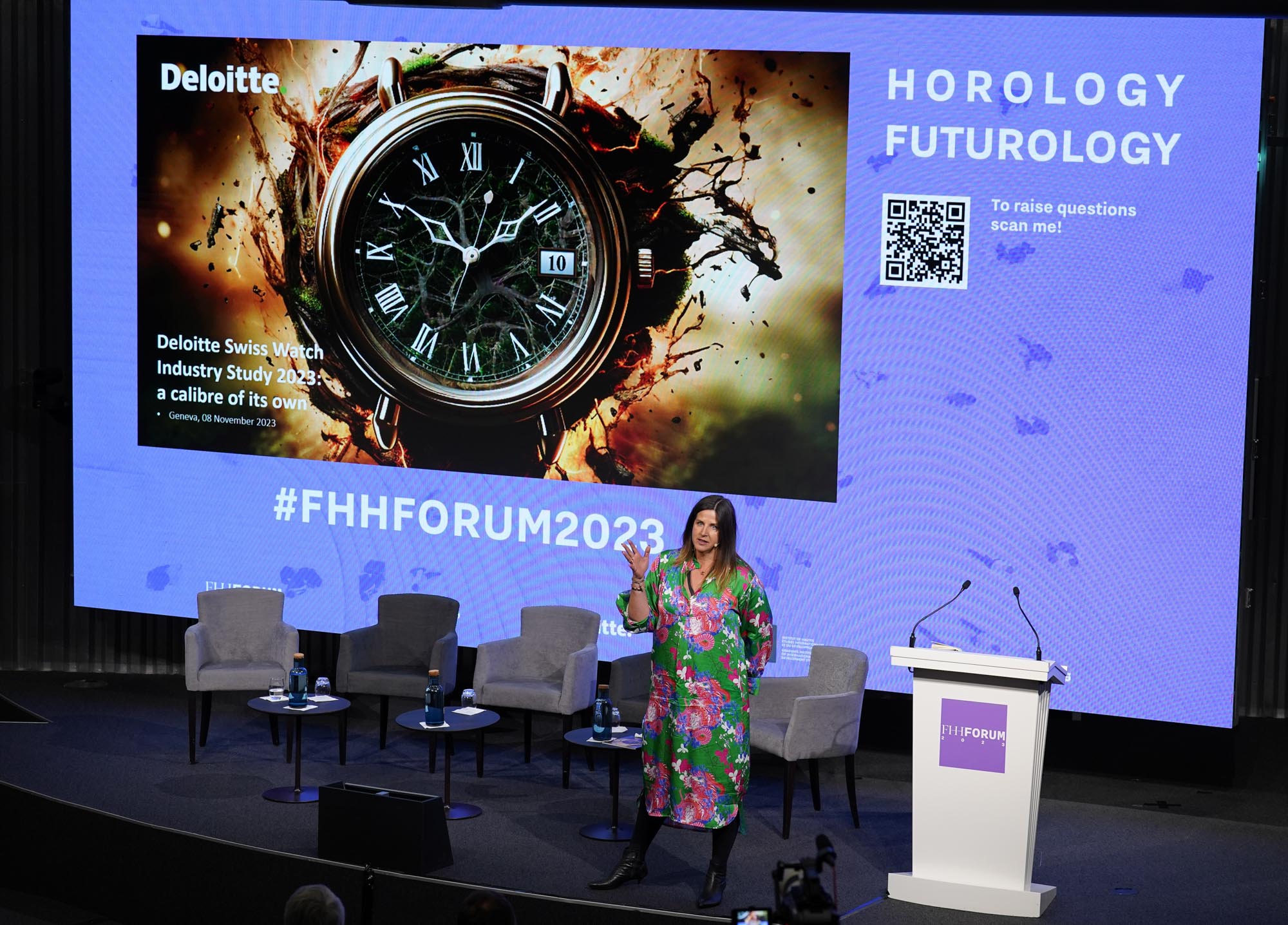
Karine Szegedi, Managing Partner for the Consumer Industry and Fashion & Luxury lead, Deloitte Switzerland, on stage during the 2023 FHH Forum.
The focus shifted to the watch industry and the revelations of the Deloitte study presented by Karine Szegedi, Managing Partner. The results notably highlighted key trends such as the growing importance of India as an emerging horological market, and the greater price awareness and curiosity of new generations. Diana Derval, chief researcher at DervalResearch; Austen Chu, founder and CEO of Wristcheck; Scott Wempe, Limited Partner and Co-Head of Business Development at Wempe; and Guido Terreni, CEO of Parmigiani Fleurier then joined Ms. Szegedi around a fascinating panel entitled, “The Behaviors of the Watch Customer: Expectations and Aspirations.”
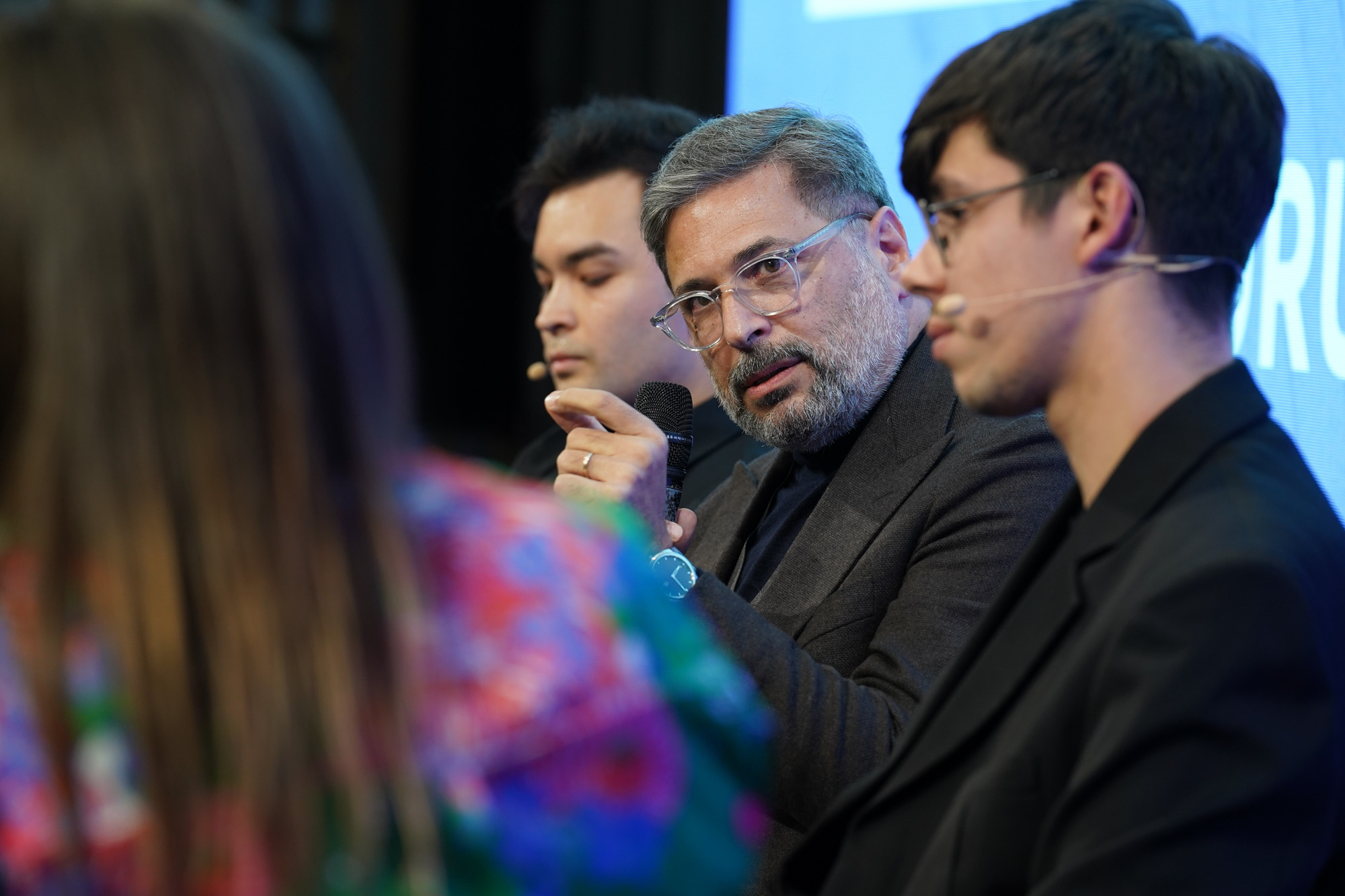
Diana Derval (DervalResearch), Austen Chu (Wristcheck), Scott Wempe (Wempe), and Guido Terreni (Parmigiani Fleurier), joined Ms. Szegedi around a fascinating panel.
Chu shared his insight as an entrepreneur who started his online watch trading platform and transferred from the online space into brick-and-mortar — as opposed to the much more common opposite. Chu remarked on how a physical presence enforces trust, especially in a consignment-based business where clients frequently consign or purchase watches worth tens of thousands of dollars each, and how that trust is quickly transformed into one-click purchases by the second or third interaction. Terreni reminded the audience of the virtually limitless attention and, indeed, desire for fine details among the experienced luxury watch-buying community, where details — such as literally microscopic guilloché that high-resolution cameras struggle to discern — are recognized and celebrated by keen-eyed customers. Wempe remarked on the importance of diversity among sales staff, noting how it is a much more efficient and trusted way to cater to a global customer base than trying to cross-train a pre-existing, less diverse team.
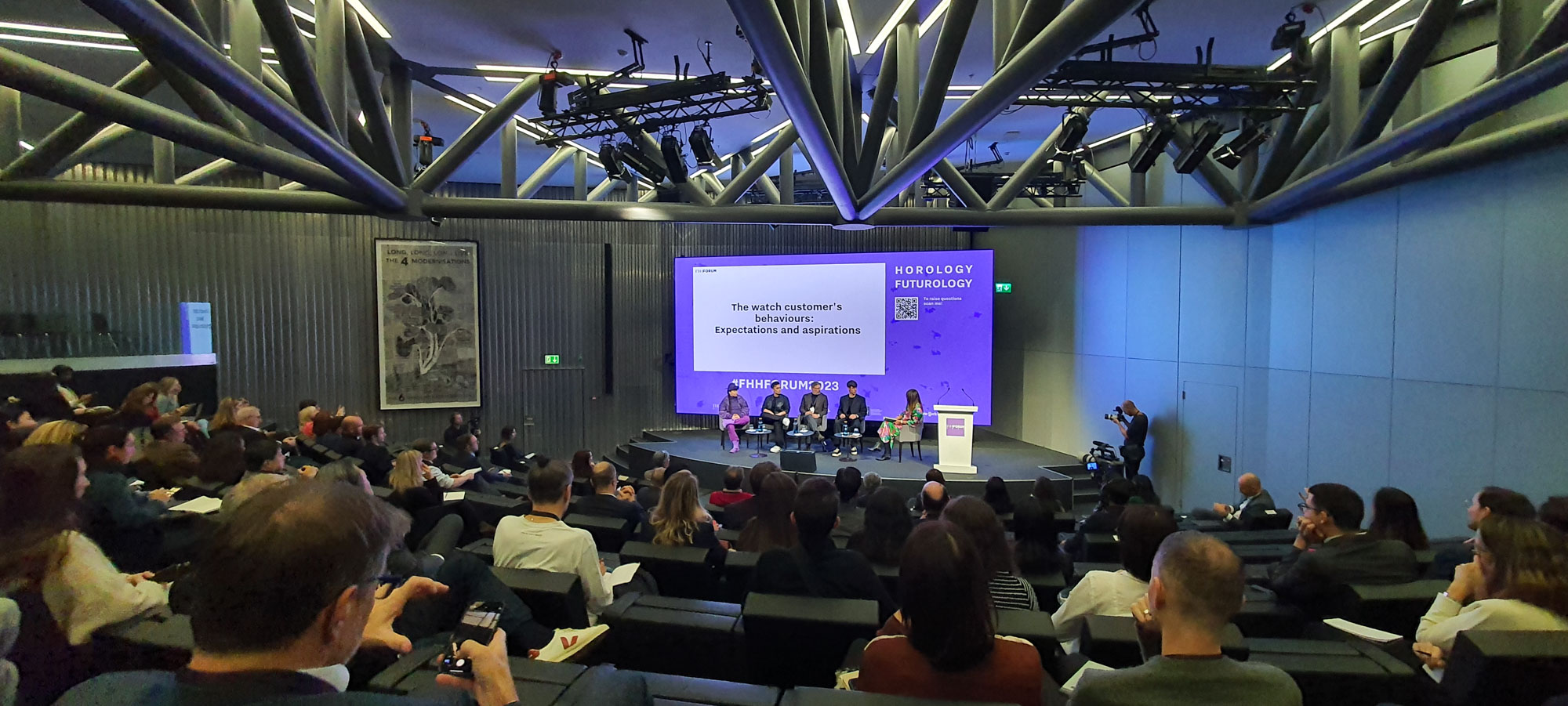
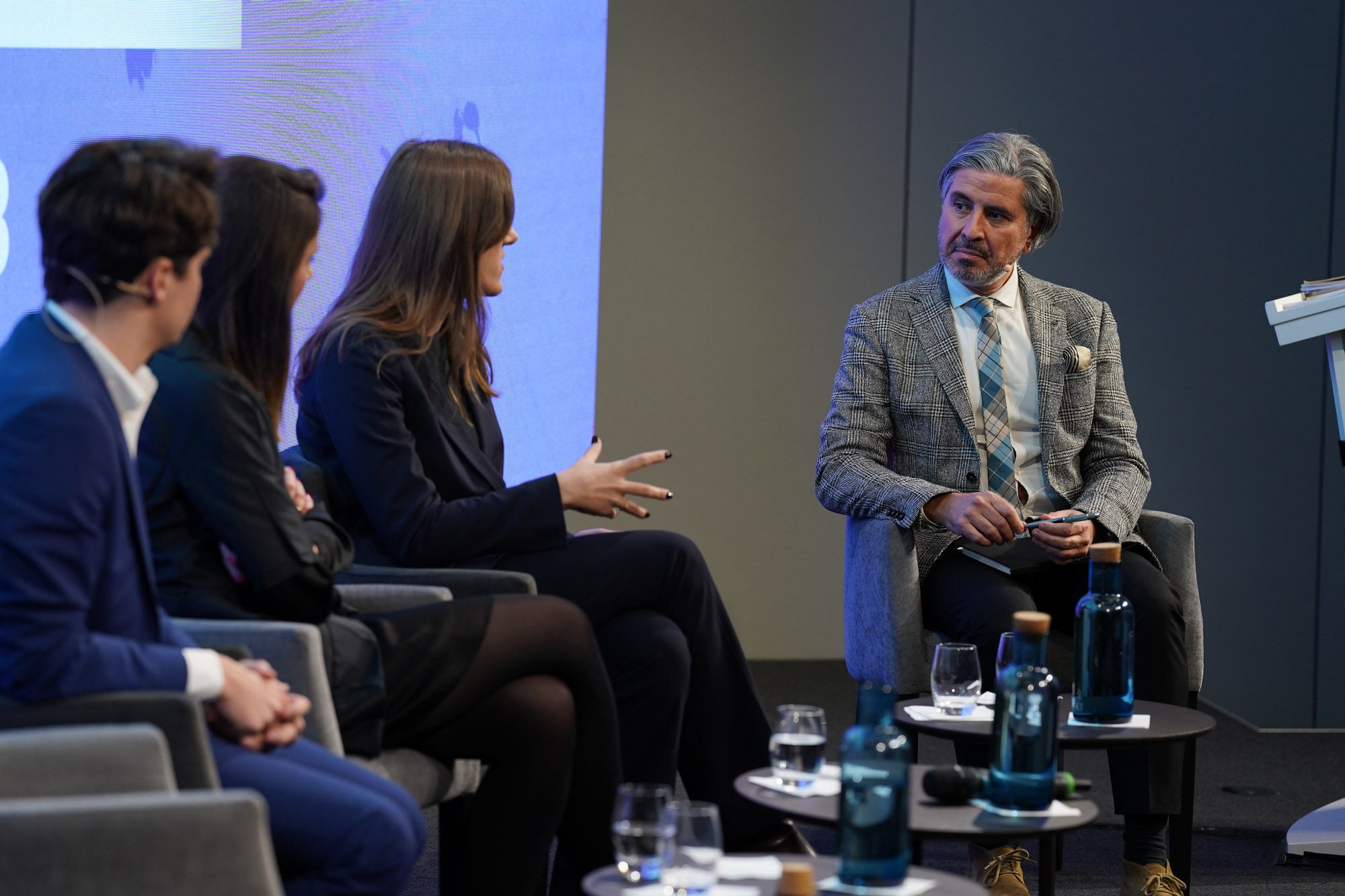
In closing, the panel on “A Prospective Evolution of Watchmaking Customer Engagement” was moderated by Stéphane JG Girod, with speakers Anne-Sophie Scharff, head of strategic planning at Digital Luxury Group, Matthias Fuchs, assistant professor of marketing at EHL, and Clara de Pirey, global luxury director at Nelly Rodi, focusing on new trends and the emerging concept of “Retailtainment”.
The concluding notes by Pascal Ravessoud, Vice-President of the FHH, highlighted that the world and, thus, the watch industry has been facing lots of uncertainty and challenges that will hopefully not end in a Renaissance fashion. He emphasized the importance of diversifying boards and management by adding scientists, as well as by adding a seat for the not-yet-born, those who don’t yet have a voice of their own but will be severely affected by the decisions made today. The 2023 FHH Forum has proven that complex periods have highlighted the watch industry’s ability to adapt and innovate. Stay tuned for what future editions have in store — and, until then, learn more at the FHH website.
Sponsored Posts are a form of advertising that allows sponsors to share useful news, messages, and offers to aBlogtoWatch readers in a way traditional display advertising is often not best suited to. All Sponsored Posts are subject to editorial guidelines with the intent that they offer readers useful news, promotions, or stories. The viewpoints and opinions expressed in Sponsored Posts are those of the advertiser and not necessarily those of aBlogtoWatch or its writers.
